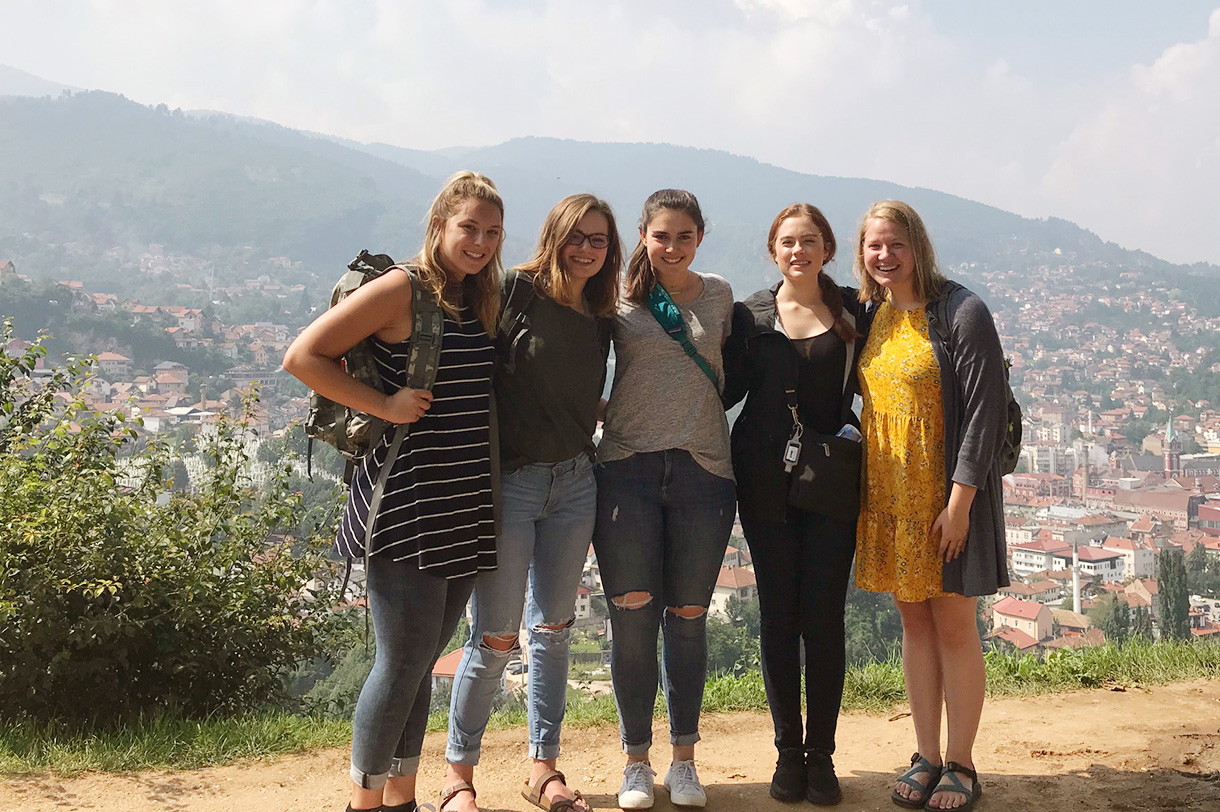Published on Oct. 10, 2018

At the MU Honors College, learning does not stop when the semester ends. This past summer, five honors students traveled to Bosnia through an Honors College study abroad program. They spent 13 days studying the history, outcomes and lasting effects of the Bosnian genocide.
Fee Pauwels, a senior double majoring in international business and psychology, chose the program because of its relevance to her major and its unique coursework.
“I had never been to Bosnia or that part of the world, so I didn’t really know what to expect,” Pauwels says. “America doesn’t really ever talk about Bosnia or the genocide. We figured we would learn a lot when we got there.”
Honors College Director J.D. Bowers organized the trip, which was led by a survivor of the Bosnian genocide, Muhamed Durakovic. Durakovic arranged for speakers from various fields to lecture and hold discussions for the group. Speakers ranged from political researchers to the head of the mission of the International Criminal Tribunal, the group that prosecuted the war criminals from the genocide.
“Working with Muhamed, we made sure there would be enough depth so that our students would be able to engage in exploration of the issues as they are currently playing out in Bosnia,” Bowers says. “Even though the violence in Bosnia is over, the legacy of the genocide is not, so that is really what we were looking at.”
After spending a week studying and exploring in Sarajevo, the capital of Bosnia, the group moved on to Srebrencia to participate in the Marš Mira, or the Peace March. The Marš Mira is an annual march that mimics the route that thousands of Bosnian men walked to escape persecution during the genocide. It stretches over 70 kilometers and lasts three days.
According to Pauwels, the majority of the marchers were Bosnians honoring the legacy of their fathers and grandfathers who fled the violence via mountain trails and country roads; the same path is retraced, in reverse, for the march. Though she was surrounded by strangers, Pauwels recalls a feeling of support and togetherness throughout the hike
“It rained the week before, so the hiking paths turned into horrible mud,” Pauwels says. “Mirroring the actual march, the hike turned into a huge column of people all struggling to get up the hills. There was one moment where I slipped, and this man behind me grabbed my backpack to lift me up and continued to push me for several minutes thereafter.”
Like Pauwels, Madison Wright, a senior journalism major, was touched by how those in the march supported each other.
“When discussing genocide and war crimes, it is easy to lose faith in humanity, but when I was slipping in the mud and falling for what seemed like the thousandth time, there were always several people willing to help me up,” Wright says.
This sense of community shared by the marchers added a deeper meaning to the march, Bowers says. While the experience was a roller coaster of emotions, going through it as a group made it more special.
“There were feelings of pain and disbelief during the march, but also a sense of empowerment,” Bowers says. “The community of four or five thousand people on the same hike for the same purpose adds a powerful perspective.”
Though the students in the program dealt with heavy topics for most of the trip, Wright remembers her experience as a very positive one.
“It was often a difficult and heart-wrenching experience,” Wright says. “Though we were studying a difficult topic, my experience is more often defined by the beauty of Bosnia and the people I met there. Heartbreaking stories were shared, but so were stories about families, careers, children and favorite jokes.”
Pauwels emphasizes that what she learned through her study abroad experience surpasses the potential knowledge she could have gained by discussing the genocide in a classroom.
Through the trip, Pauwels learned the importance of listening, without judgment, to the people around you.
“Everyone has a story to tell and the power of listening can broaden both your perspective and your understanding,” Pauwels says. “When someone comes from a place that you don’t understand, try not to assume things or make judgments. I have so much respect for people that are willing to share their stories, and not just about genocide, but about sexual assault or stories of discrimination. It’s a lesson that can very much be applied a college campus.”
While this is the first time MU students have participated in this program, the course is just one of many offered by the Honors College on genocide and its legacies that are supported, in part, by the Cheng Program in Honors.